#Ethiopian gospel
Text
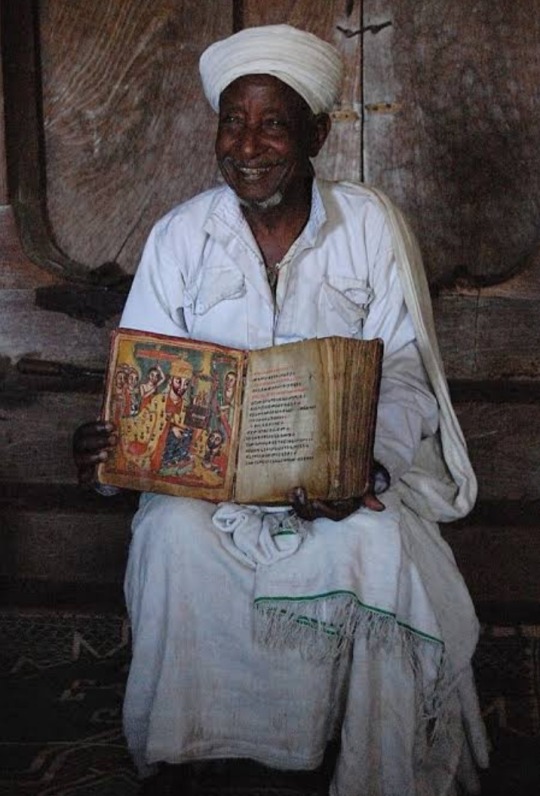
Ethiopian Bible — considered as the oldest and most complete 'Bible' on earth.
The world’s earliest illustrated Christian book has been saved by a British charity, which located it at a remote Ethiopian monastery.
The incredible Garima Gospels are named after a monk who arrived in the African country in 5th century AD.
Abba Garima arrived from Constantinople in 494 AD. Legend has it that he was able to copy the Gospels in a day because God delayed the sun from setting and is said to have copied them out in just one day.
It is beautifully illustrated and the colours are still vivid. It has been conserved through the Ethiopian Heritage Fund.
The incredible relic has been kept ever since in Garima Monastery near Adwa in the north of the country, which is in Tigray region at 7000ft.
Experts believe it is also the earliest example of book binding still attached to the original pages.
The survival of the Gospels is incredible considering the country has been under Muslim invasion, Italian invasion, and a fire in the 1930s destroyed the monastery’s church.
They were written on goat skin in the early Ethiopian language of Ge’ez.
There are two volumes dated from the same time, but the second is written in a different hand from the first. Both contain illustrations and the four Gospels.
Though the texts had been mentioned by the occasional traveller since 1950s, it had been thought they dated from 11th century at the earliest.
Carbon dating, however, gives a date between 330-650 AD, which tantalisingly overlaps the date Abba Garima arrived in the country.
So, the first volume could be in his hand – even if he didn’t complete the task in a day as the oral tradition states.
The charity Ethiopian Heritage Fund that was set up to help preserve the treasures in the country has made the stunning discovery.
It also allowed incredible rare access to the texts, so experts could conserve them on site. It is now hoped the Gospels will be put in a museum at the monastery where visitors will be able to view them.
Blair Priday from the Ethiopian Heritage Fund said:
"Ethiopia has been overlooked as a source of these fantastic things. Many of these old Christian relics can only be reached by hiking and climbing to remote monasteries as roads are limited in these mountainous regions.
All the work on the texts was done in situ and everything is reversible, so if in future they can be taken away for further conservation, we won’t have hindered that.
The pages had been crudely stitched together in a restoration in the 1960s and some of the pages wouldn’t even turn. And they were falling to pieces.
The Garima Gospels have been kept high and dry, which helped preserve them all these years. They are kept in the dark so the colours look fresh.
This was the most astounding of all our projects. The Patriarch, the head of the Ethiopian Church, had to give his permission.
Most of the experts did the work for nothing. We are currently undertaking other restoration programmes on wall paintings and religious texts.
We believe that preserving Ethiopia’s cultural heritage will help to increase visitor revenue and understanding of the extraordinary history of this country."
📷 : Credit to the Owner
#Ethiopian Bible#bible#Garima Gospels#Ethiopia#Abba Garima#Ethiopian Heritage Fund#Garima Monastery#The Patriarch#Ethiopian Church
13 notes
·
View notes
Text
This is desert
“Now an angel of the Lord spoke to Philip, saying, “Arise and go toward the south along the road which goes down from Jerusalem to Gaza.” This is desert. So he arose and went. And behold, a man of Ethiopia, a eunuch of great authority under Candace the queen of the Ethiopians, who had charge of all her treasury, and had come to Jerusalem to worship, was returning. And sitting in his chariot, he…

View On WordPress
#Believer#Bible#Christian#Christlikeness#Dying to self#Endurance#eternal life#Ethiopian eunuch#Evangelism#God#Gospel#Grace#Holy Spirit#Jesus#Love#Peace#Philip#prayer#salvation#sovereignty
4 notes
·
View notes
Text
ACTS 8:4-40
”But the believers who were scattered preached the Good News about Jesus wherever they went. Philip, for example, went to the city of Samaria and told the people there about the Messiah. Crowds listened intently to Philip because they were eager to hear his message and see the miraculous signs he did. Many evil spirits were cast out, screaming as they left their victims. And many who had been…

View On WordPress
0 notes
Text
Good News for All (Acts 8:26-40)
A divine appointment is two people very different from one another becoming changed from their interaction.
11th century Byzantine depiction of Philip and the Ethiopian eunuch
An angel from the Lord said to Philip, “Get up, and take the desert road that goes south from Jerusalem to Gaza.” So Philip went.
An Ethiopian man who had come to Jerusalem to worship was on his way home. The man was a eunuch, a high-ranking official in charge of all the treasures of Queen Candace of Ethiopia. As the official…
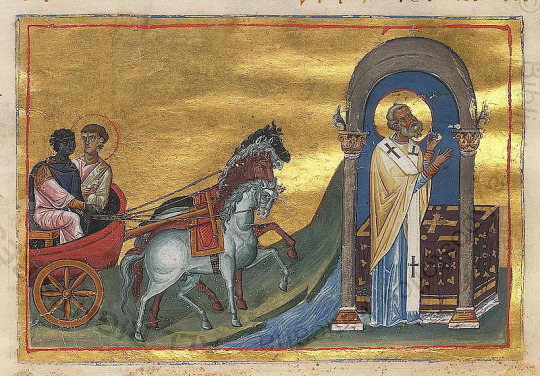
View On WordPress
#acts 8#acts of the apostles#apostle philip#change#changed life#christian discipleship#christian faith#christian life#christian message#christian ministry#christian mission#christian spirituality#christianity#divine appointment#epiphany#ethiopian eunuch#evangelism#god&039;s grace#good news#gospel#grace#jesus christ
0 notes
Note
my understanding of the apocrypha were most were recognized as canon by the Roman Catholic Church and other Orthodox Churches but as I'm trying to find more information online I'm getting more confused about what's considered canon by who (mostly the Roman Catholic Church as that is what I was raised in) do you have resources that clearly explain and/or list which denominations recognize which apocrypha?
So there’s a distinction to be made between what we on the show call capital-A Apocrypha and lower case-a apocrypha.
The capital-A type is also known as the Deuterocanon, and it represents the various late-era books that are present in the Greek translation of the Hebrew Scriptures called the Septuagint, but which are *not* included in the authoritative Hebrew text of the Bible known as the Masoretic text. (NB: the Septuagint is many centuries older than the Masoretic text.)
When Martin Luther translated the Bible into German, he separated these texts and put them at the end as being worthy of study but not as authoritative as the other material. Later American English editions of the Bible would subsequently cut the Apocrypha/Deuterocanon altogether to save on printing costs. So if you grew up in a Protestant church and don’t know what Bel and the Dragon is, that’s why.
These books include Tobit, Judith, and 1 and 2 Maccabees, among about a dozen others. You will find these in pretty much any Catholic Bible.
In addition, the Eastern Orthodox Church accepts a small handful more, including 3 and 4 Maccabees, 1 and 2 Esdras, and a bonus Psalm. If you buy a copy of a study version of the NRSV such as a NOAB or the new SBL study Bible, you should find that it contains all of the Deuterocanon of both the Catholic and Eastern Orthodox churches.
Where things start to get broader is in some of the Oriental Orthodox churches, most notably the Ethiopian Orthodox Tewahedo Church, which has over 80 books in its broader canon (numbers differ), including Jubilees and 1 Enoch.
Where the confusion comes, I think, is from the fact that the word apocrypha is also used to refer to works that were never part of any official canon despite their popularity and influence. Elements of these books have come into Catholic belief through tradition, however, even though they have never been official scripture. The Infancy Gospel of James is a major example of a book that has never been canon but which nevertheless has had an outsize influence on Catholic teaching.
Wikipedia has a chart that you may or may not find useful depicting which books are canon where
A short rule of thumb is this: the only Apocrypha considered canon by any church is Jewish in origin. There is no New Testament apocrypha held as canon by any major church
63 notes
·
View notes
Text
How it starts

A bunch of names on a list.
That’s the heart of today’s Gospel. With Jesus calling the Twelve Apostles by name.
That’s how it starts.
Why them? A closer look at any of them offers no answers.
If God’s human resources department had put together a job description for what Jesus was calling them to (“Experienced C-suite leaders wanted to assist the Second Person of the Trinity in carrying out the plan of redemption for humanity...”), none of them would have made it to the first interview.
Which tells us what? That the important part isn’t the one being called.
The important part is the One doing the calling.
A point made even clearer by the paths that each of them took. If you look at where each of them starts and where each of them ends, they’re all over the map.
Philip questions Jesus’ ability to do what He says He will do. Then ends up baptizing the first Ethiopian Christian.
Thomas doubts Jesus’ Resurrection. Then ends up as the Apostle of India.
Peter abandons and denies Jesus. Then ends up becoming the first Bishop of Rome, the first Pope.
None of them run in a straight line from their unremarkable starts to their well-known ends.
Except for the one who goes horribly wrong. Who remains sadly consistent through it all.
Which shows us that the important part isn’t the one being called.
The important part is the One doing the calling.
Make no mistake, God is calling each of us, God is calling you, by name.
And the only way to truly blow isn’t by getting it wrong or making mistakes.
The only way to truly blow it is by steadfastly refusing to come back to the One who loves you best.
Because it’s not about how you start, but how you end.
#How it starts#How it ends#Straight line#Called by Jesus#Called#God#Jesus#Catholic#Christian#Church#Moments Before Mass
19 notes
·
View notes
Text

Today I am starting my study of Acts 8 but what is it about?
Acts 8 is a chapter in the Book of Acts which details the spread of the Gospel beyond Jerusalem. In this chapter, we see the persecution of the early church by Saul, who later becomes the Apostle Paul. Philip, one of the seven chosen for ministry in Acts 6, plays a significant role in spreading the Gospel to the Samaritans and an Ethiopian eunuch. The chapter highlights the power of the Holy Spirit in transforming lives and the importance of sharing the Good News with all nations. What is your favorite point about Acts 8?
#bible study#bibledaily#bible#christianity#jesus christ#gospel#bible scripture#jesus#bible wichapas#daily devotion
7 notes
·
View notes
Text
Exploring the Higher Planes (Heavens), the Inner Space Within You - Spiritual Awakening Radio Podcast

The heavens or higher planes are not located in some abstract 'elsewhere' countless light-years away, but rather they are within us, accessed within the temple of the human body, are within all human beings... thus meditation... thus the need to discover the complete meditation practice by which we may access these realms, the Kingdom of God within (Inner Space).
References, Subjects, and Sources Include:
Carl Sagan, String Theory, Michio Kaku, Julian P. Johnson, Path of the Masters, multiple dimensions, bubble universes, cosmic foam, creation, Hazur Baba Sawan Singh, George Arnsby Jones, The Pilgrimage of James - An Odyssey of Inner Space, Audible Life Stream, Sound Current, Divine Sound, Hinduism, Shamanism, Buddhism, Kabbalah, Gnosticism, Christian Mysticism, Sufism, Santmat, schools of spirituality, Tree of Life, Gnostic universe, charts of the heavens, Dead Sea Scrolls, Ethiopian Bible, Book of Enoch, Marsanes, Mar Sanes the Syrian, Nag Hammadi Library, Gospel of Thomas, The Unknown Silent One, Nameless One, Soundless One, Anami Purush, Plotinus, The Many and the One, Ocean of Love, Anurag Sagar, Surat Shabd Yoga, Inner Light and Sound Meditation, Ajna Chakra, Third Eye, Seat of the Soul, Rumi, Kabir, Kaivalya, Nirvana, Sat Lok, Sach Khand, Saint Teresa of Avila, The Interior Castle, Param Poojya Shahi Swami, Maharshi Mehi Paramhans, Sant Ram Singh Ji Maharaj, If We Do Our Devotion, Then We Need Not Get Disheartened - God Almighty Will Always Send The Saints To Awaken Us, Without Satsang, Sant Mat Is A Very Difficult Path To Tread On, Bhakti, Prem, Spiritual love and devotion, Simran, Dhyan, Bhajan, Enchanted Land: A Journey With the Saints of India, Yogani Mataji, Radhasoami Mat Prakash, Hazur Maharaj Rai Saligram, The Life of Baba Somanath - Saint and Sage of South India, Book of Mirdad;
Exploring the Higher Planes (Heavens), the Inner Space Within You - Spiritual Awakening Radio Podcast @ YouTube:
https://youtu.be/HQflezYdSCA
Exploring the Higher Planes (Heavens), the Inner Space Within You - Spiritual Awakening Radio Podcast - Listen and/or Direct MP3 Download @
https://traffic.libsyn.com/spiritualawakeningradio/Exploring_the_Higher_Planes.mp3
@ the Podcast Website With Buttons That Go To All the Popular Podcast APPS - Wherever You Follow Podcasts:
https://SpiritualAwakeningRadio.libsyn.com/exploring-the-higher-planes-heavens-the-inner-space-within-you
@ Apple Podcasts:
https://podcasts.apple.com/us/podcast/exploring-the-higher-planes-heavens-the-inner/id1477577384?i=1000638529456
@ Spotify:
https://open.spotify.com/episode/1ILWSGnDZLVAAzTfal8dqw
& @ Wherever You Subscribe and Follow Podcasts - At Your Favorite Podcast APP Just Do a Search for "Spiritual Awakening Radio" - (YouTube, Apple Podcasts, Spotify, Google Podcasts, Amazon, Audible, PodBean, Podcast APP, Overcast, Jio Saavan, iHeart Radio, Podcast Addict, CastBox, etc...):
https://linktr.ee/SpiritualAwakeningRadio
In Divine Love (Bhakti), Light, and Sound, At the Feet of the Masters, Radhasoami,
James Bean
Spiritual Awakening Radio Podcasts
Sant Mat Satsang Podcasts
Sant Mat Radhasoami
A Satsang Without Walls
https://www.SpiritualAwakeningRadio.com

#heavens#inner space#meditation#inner light and sound#spirituality#podcasts#spiritual books#consciousness#spiritual awakening radio#sant mat satsang podcasts#sant mat#radhasoami#satsang#higher planes#eckankar#masterpath#gnosticism#gnostic#mystics#mysticism
13 notes
·
View notes
Text
Simon of Cyrene, an African and the father of Alexander and Rufus. Carried the cross Christ would be crucified upon when Jesus became too weak to continue under its weight. Simon of Cyrene is mentioned in the Gospels of Matthew, Mark and Luke. Simon's son Rufus may have been the same man the Apostle Paul greets in his letter to Rome (the biblical Epistle of Romans), whom he calls “chosen in the Lord” and whose mother “has been a mother to me, too” (Romans 16:13). The Christian faith has always included Africans. By contrast a faith such as Mormonism didn't even allow Africans or non-white people to serve their church in leadership roles or receive "blessings" until a special "revelation from God" in 1978 instructed the church to start including them.

Below is one of Ethiopia's ancient "rock churches". Following the death and resurrection of Jesus, Ethiopia was one of the first nations in the world to build Christian churches and follow the teachings of Jesus Christ. More than 650 years before Mohammad was even born, Ethiopian Christians were singing praises to God the Father, His Son Jesus and the Holy Spirit. Islamic invaders attacked and enslaved Christian Africa in the years between their prophet's establishment of Islam and the early middle-ages, forcing Christian Africans to convert to Islam or die by the sword. Many chose to die. To this day Islam still preys on the people of Africa, giving them the choice of death, slavery or conversion.

Most people think Slavery ended in 1865. It still exists. These are black Africans in a slave market in Libya. Muslim nations still have a brisk slave trade and hundreds of thousands of black Africans are kidnapped, tortured and sold on a daily basis with the full blessing of Islamic mufti's and Islamic governments. The Western World doesn't seem to care very much because the west wants the oil these countries produce. How much is the life of a black slave in the Islamic world? About $400 U.S. dollars for a "healthy" young male.
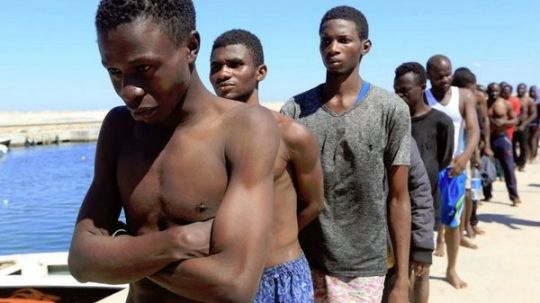
16 notes
·
View notes
Text
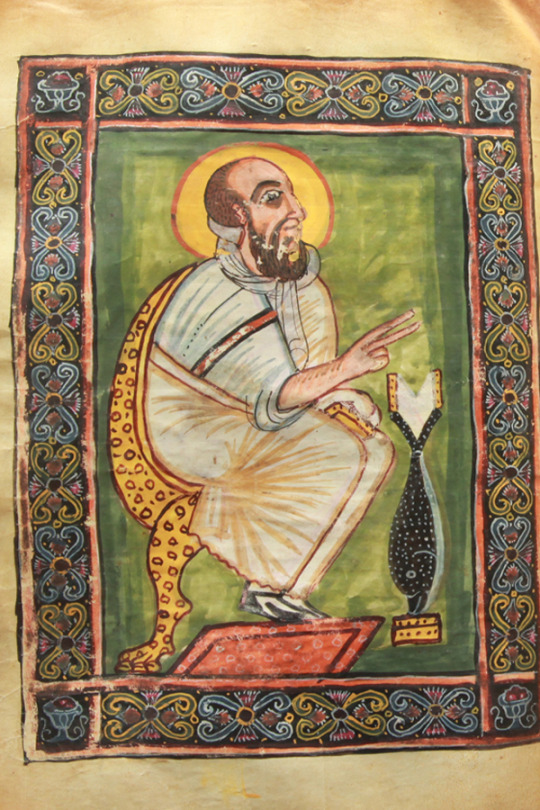
An image of Mark the Evangelist from the Ethiopian Garima Gospels, which date to about 500 CE. The gospels are the oldest known Ethiopian manuscripts; as far as anyone knows, they have never left the Abba Garima Monastery near Adwa, where they are housed to this day.
{WHF} {Ko-Fi} {Medium}
79 notes
·
View notes
Text

Prayer to St. Moses the Black (sometimes referred to as Saint Moses the Ethiopian)
Thou didst forsake temporal riches, earthly fame, and fleshly pleasure and didst freely choose a life of poverty and deprivation to become rich in spirit. Having tasted the momentary sweetness of sin, thou didst foresee the bitter end that awaits a life of self-indulgence. Having stained thy hands with the blood of thy brother, thou didst foretaste the anguish of hell. From this pit, thou didst cry out to God Who raised thee up as a testimony of His almighty power. In thy ascent to near the Living God thou didst not spare thyself but willfully endured a life of hardship and struggle. By following the path of the Cross, thy soul was empowered by the might of the Holy Spirit, thy mind was illumined with the understanding of things divine, and thy heart was filled with the burning love of God for thy fellow man. And though thou didst live in ancient times and in a distant land, today we find ourselves faced with the same struggle to overcome the evil that lies within us. In these perilous times, we call on thy prayers—help us! For our brothers and sisters are dying daily and our children are born hopeless in a world barren of Christian love. Amidst these trials, we waver because our faith is weak and we know not how to endure suffering courageously. Pray that we be strengthened to live uprightly, walking in the light of the holy Gospel, ever seeking to do the will of God. And in the dreadful day of judgment, pray that we may be received with His Unoriginate Son, and His most holy and life-creating Spirit, to whom belongs all glory, honor, and worship, now and ever and to the ages of ages. Amen.
9 notes
·
View notes
Text

18th April >> Fr. Martin's Reflections / Homilies on Today's Mass Readings (Inc. John 6:44-51) for Thursday, Third Week of Easter: ‘I am the living bread which has come down from heaven’.
Thursday, Third Week of Easter
Gospel (Except USA)
John 6:44-51
I am the living bread which has come down from heaven.
Jesus said to the crowd:
‘No one can come to me
unless he is drawn by the Father who sent me,
and I will raise him up at the last day.
It is written in the prophets:
They will all be taught by God,
and to hear the teaching of the Father,
and learn from it,
is to come to me.
Not that anybody has seen the Father,
except the one who comes from God:
he has seen the Father.
I tell you most solemnly,
everybody who believes has eternal life.
‘I am the bread of life.
Your fathers ate the manna in the desert
and they are dead;
but this is the bread that comes down from heaven,
so that a man may eat it and not die.
I am the living bread which has come down from heaven.
Anyone who eats this bread will live for ever;
and the bread that I shall give is my flesh,
for the life of the world.’
Gospel (USA)
John 6:44-51
I am the living bread that came down from heaven.
Jesus said to the crowds: “No one can come to me unless the Father who sent me draw him, and I will raise him on the last day. It is written in the prophets:
They shall all be taught by God.
Everyone who listens to my Father and learns from him comes to me. Not that anyone has seen the Father except the one who is from God; he has seen the Father. Amen, amen, I say to you, whoever believes has eternal life. I am the bread of life. Your ancestors ate the manna in the desert, but they died; this is the bread that comes down from heaven so that one may eat it and not die. I am the living bread that came down from heaven; whoever eats this bread will live forever; and the bread that I will give is my Flesh for the life of the world.”
Reflections (12)
(i) Thursday, Third Week of Easter
It is impossible to hear the reference to Gaza in today’s first reading without thinking of the horrific human catastrophe that has been unfolding in the Gaza strip today. The reading describes an event that took place in the very early church on the desert road that goes down from Jerusalem to Gaza. An Ethiopian, an official at the court of the queen of Ethiopia, was on his way home having gone on pilgrimage to Jerusalem. He may have been a pagan who was attracted to the Jewish faith. The reading suggests he was someone who had a searching spirit. He was seeking after the truth. He was sitting in his chariot, reading aloud a passage from the prophet Isaiah and struggling to understand what it meant. When Philip, a leader in the early church, approached him, the Ethiopian asked, ‘Tell me, is the prophet referring to himself or someone else?’ His question was the opening Philip needed to preach the gospel to him. Having heard the gospel, the Ethiopian was moved to ask Philip to baptize him. In the gospel reading, Jesus says, ‘No one comes to me unless he is drawn by the Father who sent me’. The Ethiopian was drawn by God the Father to Jesus, without him realizing it initially. God tends to draw us to Jesus through others. On this occasion, God drew the Ethiopian to his Son through Philip. God is constantly drawing people to Jesus and he does so by working through those who already believe in Jesus. God wants to work through each one of us to draw others to his Son, our risen Lord. God needs us to witness to our faith in some way, if others are to be drawn to the Lord. There are people among us searching for the one who says of himself in today’s gospel reading, ‘I am the bread of life’, the one who can satisfy our deepest spiritual hunger. We can all be a Philip for those who are searching. If we are to play that vital role in someone’s life, we need to be constantly seeking the Lord for ourselves.
And/Or
(ii) Thursday, Third Week of Easter
When we hear in this morning’s first reading of the road from Jerusalem to Gaza it is hard not to think of the strained and tension-filled relationship between Jerusalem and Gaza today. Yet, the story we have just heard relating to that road is a good news story. The Ethiopian on that road is a seeker. He is reading the Jewish Scriptures, a section of the prophet Isaiah. When Philip, one of the deacons of the church joins him, he invites Philip to join him in his search and to throw light on what he is reading. The probing question he asks Philip about the text gives Philip an opening to speak to him about Jesus. Philip’s proclaiming of the gospel moved the Ethiopian to ask for baptism. When Philip left him, the Ethiopian went on his journey rejoicing. The Ethiopian was searching, but he needed help from someone who was a little further down the road of faith that he himself was. The story is a reminder to us that we need each other on the journey of faith. We all have something to receive from someone else. In the gospel reading, Jesus declares that no one can come to him unless he is drawn by God the Father. Our coming to Jesus is always in response to the Father drawing us to his Son. Yet, the Father draws us to his Son in and through each other, just as God drew the Ethiopian to Jesus in and through Philip. Sometimes we may find ourselves in the role of the Ethiopian, seeking the Lord, needing someone like a Philip to guide and lead us. At other times we may find ourselves in the role of Philip, helping someone to take a new step on their journey towards Jesus. If the Father is to draw us to his Son, we need to be ready both to receive from the faith of others and to give to others from our own faith.
And/Or
(iii) Thursday, Third Week of Easter
This morning’s first reading is one of many wonderful stories in the Acts of the Apostles, the story of how an Ethiopian eunuch who served at the court of the queen of Ethiopia came to Christ. The Holy Spirit had a major role to play in bringing the Ethiopian to Jesus, but Philip the evangelist and the Ethiopian himself had their roles to play as well. It was the Holy Spirit who prompted Philip to meet the Ethiopian. It was presumably the Spirit who prompted the Ethiopian to read the passage of Scripture that so intrigued him. The Ethiopian asked Philip to explain the Scripture he was reading and Philip responded to his request. A little later the Ethiopian asked Philip to baptize him and Philip responded to that request too. Even though the Spirit was at work in all of this process, there was a genuine human element at work too. Without the desire of the Ethiopian and the responsiveness of Philip, the work of the Holy Spirit would not have come to pass. The passage reminds us that we need the Holy Spirit to come to Christ and to grow in our relationship with him, but the Spirit, in turn, needs our contribution, our own good desires and our willingness to respond to the call of others.
And/Or
(iv) Thursday, Third Week of Easter
There is an interesting sequence across the two readings this morning. In the first reading we have an Ethiopian returning home from his pilgrimage to Jerusalem. He stops to read the Scriptures and he is very touched by a passage from the prophet Isaiah. It leads him to ask questions which eventually results in his receiving baptism into the church at the hands of Philip. Then in the gospel reading Jesus speaks of the bread that he will give as his flesh for the life of the world, a clear reference to the Eucharist. We have the three elements of word, baptism and eucharist in our two readings. Each one of them is at the core of what it means to be a follower of Jesus. In our own lives, the sequence is not so much word, baptism, eucharist as baptism, word, eucharist. Most of us were baptized as infants; we were then introduced to Jesus through the stories in the gospels, perhaps through the Acts of the Apostles and the letters of Paul, and the great texts of the Jewish Scriptures, such as the prophet Isaiah. That in turn led on to our receiving the Eucharist. For us who have been baptized, the connection between word and Eucharist remains very close. At every Mass we first have the Liturgy of the Word, and then the Liturgy of the Eucharist. The word nourishes our faith, and it is out of that nourished faith that we come to the Eucharist. The bread of the word prepares us for the bread of the Eucharist. The bread of the word is a necessary first course, as it were, that prepares us to receive the Eucharist well.
And/Or
(v) Thursday, Third Week of Easter
If we look across the two readings this morning we find an interesting sequence. We begin with an Ethiopian, who was clearly drawn to Judaism in some way. He is coming from Jerusalem and is reading from the text of the prophet Isaiah, without really understanding what he is reading. He is a seeker after truth, after God. On his search he meets with a companion who helps him to find an answer to some of his questions, who throws light on the word of God that has so intrigued him. Having been touched by God’s word, he is ready for baptism. Philip, who helped to open up God’s word for him, goes on to baptize him. The proclamation of the word leads to baptism and then in the gospel reading Jesus speaks in language that is clearly Eucharistic, ‘the bread that I shall give is my flesh for the life of the world’. As the search for God leads to the hearing of the word and as the hearing of the word leads to baptism, so baptism leads us to the Eucharist. The sequence for us has been a little different, because it began with baptism. We then received the Eucharist at a relatively early age. We can easily miss out on that earlier stage that we find in our readings, the stage of engaging with the Scriptures, questioning them and searching for answers to our questions. That stage is more appropriate to adulthood. When we engage in it, it helps us to appreciate more fully both the sacrament of baptism and of the Eucharist.
And/Or
(vi) Thursday, Third Week of Easter
In this morning’s gospel reading, Jesus makes the striking statement, ‘everybody who believes in me has eternal life’. He does not say, ‘will have eternal life’, but he says, ‘has eternal life’. We would normally think of eternal life as beginning after our earthly life is completed, but this morning’s gospel reading suggests that eternal life is somehow accessible to us here and now, during this earthly life. Eternal life in the gospel of John is understood as a life of communion with Jesus, the source of true life. Such a life of communion with the Lord can be experienced here and now by all those who believe in him, who come to him in faith and who try to keep his word. In so far as we are in communion with the Lord in this life we already experience something of the eternal life that awaits us. Communion with the Lord is the gateway to eternal life here and now and beyond this life. We traditionally use the term ‘holy communion’ to refer to the Eucharist. We recognize that in and through the Eucharist we enter into communion with the Lord, and with each other, in a special way. Because it is a time of communion with the Lord, the church has always understood the Eucharist as the anticipation of eternal life. In this moment of communion, heaven comes to earth and eternal life breaks into this earthly life.
And/Or
(vii) Thursday, Third Week of Easter
In this morning’s first reading we have a striking example of faith seeking understanding. An Ethiopian officer at the court of the Queen of Ethiopia was on his way from Jerusalem to Gaza. Coming as he was from Jerusalem, he was clearly drawn to the Jewish faith. On his way to Gaza, he sat in his chariot to read from the Jewish Scriptures, the book of Isaiah. He did not understand what he was reading. When one of the early preachers of the gospel, Philip, approached the Ethiopian, he asked Philip to explain to him what he was reading, ‘Tell me, is the prophet referring to himself or someone else?’ Here indeed was faith seeking understanding. Philip’s teaching led to the Ethiopian requesting baptism. When it comes to our faith, there is a great deal to understand. Ultimately, the object of our faith is beyond full human understanding, at least in this life. Yet, the journey of seeking to understand our faith is one we are all invited to set out on. In the gospel reading this morning, Jesus calls on the crowd to hear the teaching of the Father, and to learn from it. Jesus suggests that God is always teaching us and encouraging us to be learners. A little later in that same gospel of John, Jesus declares that, after his death and resurrection, he will send us the Spirit of Truth, the Holy Spirit, who will guide us into all the truth. As our faith seeks understanding, we are assured of the guidance of the Spirit, without whom true understanding is not possible.
And/Or
(viii) Thursday, Third Week of Easter
In today’s gospel reading Jesus declares both ‘everybody who believes has eternal life’ and ‘anyone who eats this bread will live for ever’. It appears that eating Jesus the bread of life is an image for believing in Jesus. However, when Jesus goes on to say, ‘the bread that I shall give is my flesh for the life of the world’, the term ‘bread’ begins to acquire a Eucharistic meaning. Jesus will go on to speak about the need to eat his flesh and drink his blood, which has even clearer Eucharistic overtones. Yet, eating the bread that is Jesus, in the sense of believing in Jesus, comes before eating his flesh or his body in the Eucharist. The Eucharist, like all the sacraments, presupposes faith. We first come to Jesus in faith before we come to him in the Eucharist. We find a similar pattern in the first reading. The faith of the Ethiopian is first nurtured by Philip through his proclamation of the word before the Ethiopian comes to celebrate the Sacrament of Baptism. The Sacrament of Baptism, like the Sacrament of the Eucharist, also presupposes faith. In the case of infants, it is the faith of the parents and family and the faith of the believing community that is presupposed. The first reading reminds us that an encounter with the Lord in his word is often prior to an encounter with him in the Sacraments. The word of the Lord nurtures our faith in preparation for our encounter with him in the Sacraments.
And/Or
(ix) Thursday, Third Week of Easter
There are a number of similarities between the story of the Ethiopian in today’s first reading, from the Acts of the Apostles. and the story of the two disciples on the road to Emmaus in Luke’s first volume, his gospel. The two disciples were journeying away from Jerusalem when the risen Lord joined them in the form of a stranger and opened the Scriptures for them. The Ethiopian eunuch was journeying away from Jerusalem when Philip, one of the missionaries of the early church, joined them and opened up the Scriptures for him. The opening up of the Scriptures for the two disciples led them to the recognition of the Lord in the breaking of bread, the Sacrament of the Eucharist. The opening up of the Scriptures for the Ethiopian led him to the Sacrament of baptism. In both cases, the hearing of the Word led to a deeper encounter with the Lord in the Sacrament. Afterwards, both the two disciples and the Ethiopian went on their way rejoicing. That sequence of word leading to sacrament has always been central to the church’s life. It is present again in today’s gospel reading. In that reading, Jesus declares that we first need ‘to hear the teaching of the Father and learn from it’ before we can come to him as the bread of life who gives us his flesh, his body, for the life of the world. Listening to God’s word prepares us, disposes us, to recognize and receive the Lord who comes to us in the Sacraments. Today’s first reading suggests that such listening to God’s word will often entail a struggle to understand it. The Ethiopian was full of questions as he listened to God’s word. The story of the Ethiopian shows that such questions are not an obstacle on our journey towards the Lord but can serve that journey well.
And/Or
(x) Thursday, Third Week of Easter
The portrayal of the Ethiopian in today’s gospel reading suggests that he was engaged in a spiritual search. He had been on pilgrimage to Jerusalem. People who go on pilgrimage are often seeking to know God more fully. On his way home from the pilgrimage, he continued to engage in his spiritual quest, reading from the prophet Isaiah. It is notable that the text says that Philip heard him reading Isaiah the prophet. The Ethiopian was not reading silently to himself; he was reading aloud. This was how people usually read the Scriptures at that time, even when they were alone. His reading of the passage gave rise to a question for him that he sought an answer to from Philip, ‘Tell me, is the prophet referring to himself or someone else?’ When Philip then proclaimed the gospel to him, the Ethiopian took a further initiative on his spiritual quest, again in the form of a question, ‘Look, there is some water here; is there anything to stop me being baptized?’ Having been baptized by Philip, the Ethiopian went on his way rejoicing. Even though the Lord drew near to the Ethiopian through Philip, the Ethiopian himself was drawing near to the Lord, through his reading of the Scriptures, his questioning spirit, and his request for baptism. In the gospel reading, Jesus says, ‘no one can come to me unless drawn by the Father who sent me’. God the Father is always drawing us to his Son, as he drew the Ethiopian to Jesus through Philip. Yet, we ourselves need to take our own steps towards the Lord, the kind of steps the Ethiopian took, if the drawing of the Father is to bear fruit in our lives. Even though God’s quest for us is the more fundamental one, we need to be engaged in our own quest for God. The story of the Ethiopian shows that if we seek the Lord we will find him, because the Lord is always seeking us. These anxious days, when some have more time and space than they might usually have, can be a good moment to enter more fully into our search for the Lord who is always seeking us.
And/Or
(xi) Thursday, Third Week of Easter
In today’s gospel reading Jesus declares that our coming to Jesus is in response to the drawing of the Father, ‘no one can come to me unless they are drawn by the Father who sent me’. God the Father draws all people to his Son and our coming to Jesus is in response to the drawing of the Father. Our coming to believe in Jesus is always in response to the initiative of God the Father towards us. God is always drawing us towards his Son and if we come to Jesus, God’s Son, it is because we have responded to the drawing of God the Father. God will seek to draw us to his Son in a variety of ways. In today’s first reading, an Ethiopian court official comes to faith in Jesus. God the Father draws him to his Son firstly through the Scriptures, the Word of God. As he read from the prophet Isaiah, questions rose in his heart and mind. ‘To whom is the prophet referring, himself or someone else?’ His questions arising from his reflective reading of the Scriptures were the means through which God was drawing him to his Son. God continued to draw the Ethiopian to Jesus through the ministry of Philip, who was able to engage with the Ethiopian’s questions in a helpful way. This led to the Ethiopian asking Philip on coming upon some water, ‘Is there anything to stop me being baptized?’ God the Father brought him to the point where he asked for baptism. He was immersed into the risen life of Jesus. Even those of us who have been baptized and who have come to believe in Jesus are being drawn more closely to Jesus by God the Father. God continues to draw us to his Son through the Word of God and through the ministry of other people of faith, like Philip. God never stops drawing us to his Son. In response, he looks to us for something of the same openness to being drawn displayed by the Ethiopian in our first reading.
And/Or
(xii) Thursday, Third Week of Easter
In the gospel reading, Jesus declares that all who come to him have been drawn to him by the Father, ‘No one can come to me unless drawn by the Father who sent me’. God is always drawing us towards his Son, who says of himself in the gospel reading, ‘I am the bread of life’. God draws us towards his Son as the one who can satisfy the deepest spiritual hunger of our heart. God often draws us to his Son in and through other people of faith. In the first reading, God initially draws the Ethiopian to his Son through the Scriptures. When the Ethiopian reflects on a passage from Isaiah, he begins to ask questions, ‘Is the prophet referring to himself or someone else?’ He needed the help of a person of faith to answer this question, the help of the deacon Philip. God who began to draw the Ethiopian to his Son through the Scriptures now draws him fully to his Son through the spiritual accompaniment of Philip, the preacher of the gospel. Philip’s ministry to the Ethiopian led the Ethiopian to take an initiative of his own, ‘Look, there is some water here; is there anything to stop me being baptized?’ It is as if the final step of God drawing the Ethiopian to his Son was through the medium of creation, water. Having allowed God to work through him to bring the Ethiopian to Jesus, Philip moved on from him, and the Ethiopian continued on his way rejoicing. God will find many ways of bringing us to his Son, if we allow ourselves to be drawn.
Fr. Martin Hogan.
5 notes
·
View notes
Text
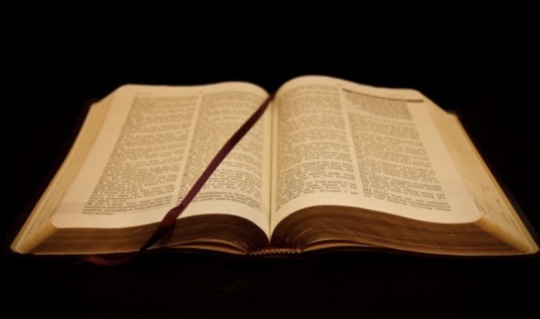
18th April >> Mass Readings (Except USA)
Thursday, Third Week of Eastertide
or
Saint Laserian (or Molaise), Bishop.
Thursday, Third Week of Eastertide
(Liturgical Colour: White. Year: B(II))
First Reading
Acts of the Apostles 8:26-40
Philip baptizes a eunuch.
The angel of the Lord spoke to Philip saying, ‘Be ready to set out at noon along the road that goes from Jerusalem down to Gaza, the desert road.’ So he set off on his journey. Now it happened that an Ethiopian had been on pilgrimage to Jerusalem; he was a eunuch and an officer at the court of the kandake, or queen, of Ethiopia, and was in fact her chief treasurer. He was now on his way home; and as he sat in his chariot he was reading the prophet Isaiah. The Spirit said to Philip, ‘Go up and meet that chariot.’ When Philip ran up, he heard him reading Isaiah the prophet and asked, ‘Do you understand what you are reading?’ ‘How can I’ he replied ‘unless I have someone to guide me?’ So he invited Philip to get in and sit by his side. Now the passage of scripture he was reading was this:
Like a sheep that is led to the slaughter-house,
like a lamb that is dumb in front of its shearers,
like these he never opens his mouth.
He has been humiliated and has no one to defend him.
Who will ever talk about his descendants,
since his life on earth has been cut short!
The eunuch turned to Philip and said, ‘Tell me, is the prophet referring to himself or someone else?’ Starting, therefore, with this text of scripture Philip proceeded to explain the Good News of Jesus to him.
Further along the road they came to some water, and the eunuch said, ‘Look, there is some water here; is there anything to stop me being baptised?’ He ordered the chariot to stop, then Philip and the eunuch both went down into the water and Philip baptised him. But after they had come up out of the water again Philip was taken away by the Spirit of the Lord, and the eunuch never saw him again but went on his way rejoicing. Philip found that he had reached Azotus and continued his journey proclaiming the Good News in every town as far as Caesarea.
The Word of the Lord
R/ Thanks be to God.
Responsorial Psalm
Psalm 65(66):8-9,16-17,20
R/ Cry out with joy to God, all the earth.
or
R/ Alleluia!
O peoples, bless our God,
let the voice of his praise resound,
of the God who gave life to our souls
and kept our feet from stumbling.
R/ Cry out with joy to God, all the earth.
or
R/ Alleluia!
Come and hear, all who fear God.
I will tell what he did for my soul:
to him I cried aloud,
with high praise ready on my tongue.
R/ Cry out with joy to God, all the earth.
or
R/ Alleluia!
Blessed be God
who did not reject my prayer
nor withhold his love from me.
R/ Cry out with joy to God, all the earth.
or
R/ Alleluia!
Gospel Acclamation
Alleluia, alleluia!
The Lord, who hung for us upon the tree,
has risen from the tomb.
Alleluia!
Or:
John 6:51
Alleluia, alleluia!
I am the living bread which has come down from heaven,
says the Lord.
Anyone who eats this bread will live for ever.
Alleluia!
Gospel
John 6:44-51
I am the living bread which has come down from heaven.
Jesus said to the crowd:
‘No one can come to me
unless he is drawn by the Father who sent me,
and I will raise him up at the last day.
It is written in the prophets:
They will all be taught by God,
and to hear the teaching of the Father,
and learn from it,
is to come to me.
Not that anybody has seen the Father,
except the one who comes from God:
he has seen the Father.
I tell you most solemnly,
everybody who believes has eternal life.
‘I am the bread of life.
Your fathers ate the manna in the desert
and they are dead;
but this is the bread that comes down from heaven,
so that a man may eat it and not die.
I am the living bread which has come down from heaven.
Anyone who eats this bread will live for ever;
and the bread that I shall give is my flesh,
for the life of the world.’
The Gospel of the Lord
R/ Praise to you, Lord Jesus Christ.
--------------------------------------
Saint Laserian (or Molaise), Bishop
(Liturgical Colour: White. Year: B(II))
First Reading
Acts of the Apostles 13:46-49
Since you have rejected the word of God, we must turn to the pagans.
Paul and Barnabas spoke out boldly. ‘We had to proclaim the word of God to you first, but since you have rejected it, since you do not think yourselves worthy of eternal life, we must turn to the pagans. For this is what the Lord commanded us to do when he said:
I have made you a light for the nations,
so that my salvation may reach the ends of the earth.’
It made the pagans very happy to hear this and they thanked the Lord for his message; all who were destined for eternal life became believers. Thus the word of the Lord spread through the whole countryside.
The Word of the Lord
R/ Thanks be to God.
Responsorial Psalm
Psalm 88(89):2-5,21-22,25,27
R/ I will sing for ever of your love, O Lord.
I will sing for ever of your love, O Lord;
through all ages my mouth will proclaim your truth.
Of this I am sure, that your love lasts for ever,
that your truth is firmly established as the heavens.
R/ I will sing for ever of your love, O Lord.
‘I have made a covenant with my chosen one;
I have sworn to David my servant:
I will establish your dynasty for ever
and set up your throne through all ages.
R/ I will sing for ever of your love, O Lord.
‘I have found David my servant
and with my holy oil anointed him.
My hand shall always be with him
and my arm shall make him strong.
R/ I will sing for ever of your love, O Lord.
‘My truth and my love shall be with him;
by my name his might shall be exalted.
He will say to me: “You are my father,
my God, the rock who saves me.”’
R/ I will sing for ever of your love, O Lord.
Gospel Acclamation
Matthew 23:9,10
Alleluia, alleluia!
You have only one Father, and he is in heaven;
you have only one Teacher, the Christ.
Alleluia!
Or:
Matthew 28:19,20
Alleluia, alleluia!
Go, make disciples of all the nations.
I am with you always; yes, to the end of time.
Alleluia!
Or:
Mark 1:17
Alleluia, alleluia!
Follow me, says the Lord,
and I will make you into fishers of men.
Alleluia!
Or:
Luke 4:18
Alleluia, alleluia!
The Lord has sent me to bring the good news to the poor,
to proclaim liberty to captives.
Alleluia!
Or:
John 10:14
Alleluia, alleluia!
I am the good shepherd, says the Lord;
I know my own sheep and my own know me.
Alleluia!
Or:
John 15:5
Alleluia, alleluia!
I am the vine,
you are the branches.
Whoever remains in me, with me in him,
bears fruit in plenty,
says the Lord.
Alleluia!
Or:
2 Corinthians 5:19
Alleluia, alleluia!
God in Christ was reconciling the world to himself,
and he has entrusted to us the news that they are reconciled.
Alleluia!
Gospel
Matthew 9:35-37
The harvest is rich but the labourers are few.
Jesus made a tour through all the towns and villages, teaching in their synagogues, proclaiming the Good News of the kingdom and curing all kinds of diseases and sickness.
And when he saw the crowds he felt sorry for them because they were harassed and dejected, like sheep without a shepherd. Then he said to his disciples, ‘The harvest is rich but the labourers are few, so ask the Lord of the harvest to send labourers to his harvest.’
The Gospel of the Lord
R/ Praise to you, Lord Jesus Christ.
2 notes
·
View notes
Text
𝐓𝐡𝐞 𝐆𝐢𝐟𝐭 𝐨𝐟 𝐄𝐯𝐚𝐧𝐠𝐞𝐥𝐢𝐬𝐦

The Greek word for evangelists is euaggelistes which means “one who brings good news.” This word is only found in two other places in the New Testament.
⁸ “On the next day, we left and came to Caesarea, where we went to the house of Philip the evangelist, who was one of the Seven, and stayed with him.”
—Acts 21:8
⁵ “As for you, always be sober. Endure hardships, do the work of preaching the gospel, and carry out your ministry to the fullest extent.”
—2 Timothy 4:5
All Christians are called to evangelize and reach out to the lost with the Gospel
¹⁸ Then Jesus approached them and said, “All authority in heaven and on earth has been given to me. ¹⁹ Go, therefore, and make disciples of all nations, baptizing them in the name of the Father and of the Son and of the Holy Spirit, ²⁰ and teaching them to observe all that I have commanded you. And behold, I am with you always, to the end of the world.”
—Matthew 28:18-20
but some are given an extra measure of faith and effectiveness in this area. The spiritual gift of evangelism is found in this verse where Paul says that Jesus:
¹¹ “It was he who established some as apostles, some as prophets, some as evangelists, and some as pastors and teachers, ¹² to equip the saints for the work of ministry in building up the body of Christ,”
—Ephesians 4:11-12
Evangelists are given the unique ability by the Holy Spirit to clearly and effectively communicate the Gospel of Jesus Christ to others. They are burdened in their hearts for the lost and will go out of their way to share the truth with them. Evangelists are able to overcome the normal fear of rejection and engage non-believers in meaningful conversations about Jesus. Their gift allows them to communicate with all types of people and therefore they receive a greater response to the message of salvation through Jesus Christ. They continually seek out relationships with those who don’t know Jesus and are open to the leading of the Holy Spirit to approach different people. They love giving free treasure away for Jesus,
⁷ “However, we hold this treasure in earthen vessels so that it may be clear that this immense power belongs to God and does not derive from us.”
—2 Corinthians 4:7, The State of an Apostle
and it brings them great joy knowing that the “feet that bring good news” are beautiful to those who believe.
⁷ How beautiful upon the mountains
are the feet of the messenger who announces peace,
who bears good news and proclaims glad tidings,
announcing salvation and saying to Zion,
“Your God is king.”
—Isaiah 52:7

⁵ “Philip went down to a city in Samaria and began proclaiming the Christ to them. ⁶ The crowds welcomed the message proclaimed by Philip because they had heard and seen the signs he was doing. ⁷ For unclean spirits emerged with loud shrieks from many people who were possessed, and many others who were paralyzed or crippled were cured. ⁸ Thus, there was great joy in that city.
—Acts 8:5-8
¹² However, when the people came to believe Philip as he preached about the kingdom of God and the name of Jesus Christ, they were baptized, both men and women.”
—Acts 8:12
²⁶ Then the angel of the Lord said to Philip, “Get up and head south along the road that leads from Jerusalem down to Gaza, the desert road.” ²⁷ Therefore, he got up and set out.
Now there was an Ethiopian eunuch, an official at the court of the Candace, that is, the queen of the Ethiopians, who was in charge of her entire treasury. He had come to Jerusalem to worship ²⁸ and was now returning home. As he sat in his chariot, he was reading the prophet Isaiah.
²⁹ Then the Spirit said to Philip, “Go up and join that chariot.” ³⁰ When Philip ran up, he heard him reading from the prophet Isaiah, and he asked, “Do you understand what you are reading?” ³¹ He replied, “How can I, unless I have someone to instruct me?” Then he invited Philip to get in and sit beside him.
³² This was the Scripture passage he had been reading:
“Like a sheep he was led to the slaughter;
like a lamb that is silent before its shearer
he did not open his mouth.
³³ In his humiliation justice was denied him.
Who will be able to speak of his posterity?
For his life on earth has been taken away.”
³⁴ Then the eunuch said to Philip, “Please tell me, about whom is the prophet speaking—about himself or someone else?” ³⁵ And so Philip, starting with this text of Scripture, proceeded to explain to him the good news of Jesus.
³⁶ As they were traveling along the road, they came to some water. The eunuch said, “Look, here is some water. What is to prevent me from being baptized?”
³⁷ And Philip said, “If you believe with all your heart, you may.” The eunuch said in reply, “I believe that Jesus Christ is the Son of God.”
³⁸ Then he ordered the chariot to stop, and Philip and the eunuch both went down into the water, and he baptized him.
³⁹ When they came up out of the water, the Spirit of the Lord snatched Philip away, and the eunuch did not see him again, but he went on his way rejoicing. ⁴⁰ Philip, however, appeared in Azotus and continued his journey, proclaiming the good news in every town until he reached Caesarea.”
—Acts 8:26-40, Baptism of a High Official
¹⁸ Then Jesus approached them and said, “All authority in heaven and on earth has been given to me. ¹⁹ Go, therefore, and make disciples of all nations, baptizing them in the name of the Father and of the Son and of the Holy Spirit, ²⁰ and teaching them to observe all that I have commanded you. And behold, I am with you always, to the end of the world.”
—Matthew 28:18-20
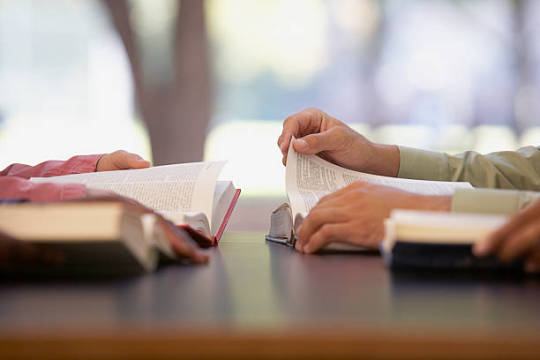
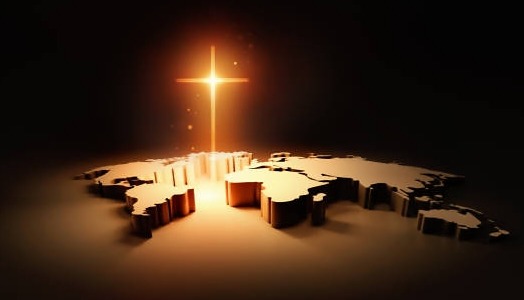
#spiritual gifts#evangelism#God#God's gifts#Holy Spirit#Jesus Christ#bible scripture#bible verse#christianity#bible study#bible#christian#Jesus#Christ#christian motivation#catholic#roman catholic#catholicism#christian quotes#christian tumblr#spiritual#spirituality#spiritual community#writeblr#writers on tumblr#writerscommunity#writersociety#the bible#christian blog#christian faith
2 notes
·
View notes
Text
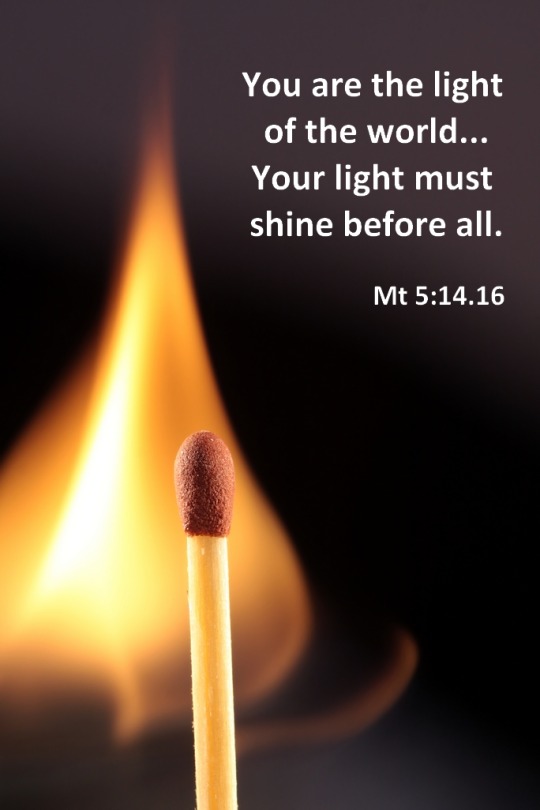
LORD OF THE HARVEST
We see that the engine of the Gospel message that drives it into the world--is His presence and glory. It is not a tantalizing self-induced experience that produces no fruit, but rather an illuminating light which leads the world to Jesus and becomes the pillar of fire that leads His Church into the world. Yet often in contemporary circles, we see the opposite in effect. We want to privatize His glory and keep it shrouded in personal experience, assuming the world will simply "catch on".
WE ARE THE LIGHT OF THE WORLD
Look at the words of Jesus carefully, "No man after he has lit a candle puts it in a secret place, neither under a bushel, but on a candlestick so that they that come in may see the light..." (Luke 11:33).
"YOU are the LIGHT of the WORLD" (Matthew 5:14).
We have become the transfiguring light of His presence and are the only hope of the world to see it. "To whom God would make known what is the riches of the glory of this mystery among the Gentiles, which is Christ in you, the hope of glory..." (Colossians 1:27).
Get ready for God to move you out of the confines and limitations of what you have mis-understood in the past about aggressively advancing His Kingdom.
OUR MISSION
Our job description now is to reveal the Light of eternity in a dark world void of it. We are light to the world and are here to TRANSFIGURE and TRANSFORM it.
In Luke 10:2, harvest is literally mentioned three times, "Then He said to them, 'The harvest truly is great, but the laborers are few; therefore pray the Lord of the harvest to send out laborers into His harvest.'"
A "reaping or crop" is not "going" to be ready. It "was already" ripe, and the only hindrance to that reaping were the workers or laborers. That word "laborer" can be interpreted in the ancient text as " teacher." This world needs to be DISCIPLED into the Word of God.
Once the new converts are harvested they need teachers to disciple them into and understanding of their Christ identity -- and help them to come to an understanding of their Christ calling.
TEACHING AND PREACHING
We can never disqualify the necessity of teaching His Word. It's the very reason the glory was given and that divine power was granted -- to "be His witnesses." Look at Philip as he encounters the Ethiopian Eunuch in Acts 8:26-39.
Philip became the prophet to Africa's royal court sent by God along the roadside. He became the teacher that illuminated the ancient text of Isaiah revealing Christ to him. Then he was a mighty evangelist who baptized the man in water along the way after the eunuch openly confessed, "I believe that Jesus Christ is the Son of God..." (verse 37).
STEPPING INTO OUR DESTINY
Rather than dissect God's power into cookie-cutter theologies, let's fully step into the brilliant light of the "Lord of the Harvest" and become His prophets, kings, priests, teachers, and evangelists to the world. Three effects of this:
We come to realize the importance of equipping the body of Christ in their Christ identity, right standing with God, and walking in the Spirit.
We suddenly realize we have entered a harvest that is a result of the answer to Jesus’ ancient prayer, "..pray the Lord of the harvest to send out laborers into His harvest"
You become that laborer and you become that harvester of a great glorious white harvest that continues to unfold as you become instrumental in equipping the body of Christ so they will be effective in advancing God’s Kingdom.
GREAT PROPHETIC ADVENTURE
The harvest we face today from the mouth of Jesus two thousand years ago. Like Philip, we run to it! This great adventure awaits us, and His glory will carry us into the white light of His presence, because we "are a city set upon a hill that cannot be hid" and we are the "Leukos" or "light of the world."
ALBERT FINCH MINISTRY
11 notes
·
View notes
Text
[“God knew there was going to be a Fall,” Luwis said, explaining his belief that just as the sin of Adam and Eve was predestined, so is it predestined that some parents are infertile because God has a child for them “in another place.” “It’s part of His plan that other families raise other children, because he knew that this world was going to have sin.”
“When we know that suffering is part of a loving God’s plan,” he continued on America World Adoption’s website, “then we can understand that the existence of orphaned children is not an accident or failure of God’s plan.”
Many Christian adoption advocates not only accept this logic but take it to absurdist ends, using it to justify laying claim to children of poorer parents. For instance, one Christian prospective adoptive parent blogged about her plans to adopt a newborn Ethiopian girl she intended to name Bethlehem. As she wrote, it became clear that the child she was talking about as an orphan in need of rescue was as-yet unborn, indicating that she had requested an adoption agency to supply her with a baby as young as humanly possible, not an orphan already out in the world in need of parental care. “Somewhere there is a woman who is pregnant with a girl,” wrote the blogger. “The woman will make a great sacrifice to give her life—either by her own death, or by handing the child who has kicked her womb for months to strangers with a desperate plea for them to care for her.” After that mother gives birth, relinquishes the child, and the child is handed over to her, the blogger, then and only then, the woman wrote, would the future child “be an orphan no more.”
This was a particularly baffling example, but not uncommon logic. Within this framing—the idea that some families’ suffering is part of God’s plan to complete other adoptive families—a child’s first family is too easily pushed aside. “Children don’t grow in cabbage patches, just waiting for us to find and rescue them,” said Karen Dubinsky, author of Babies without Borders. “In order for the ‘rescue’ narrative to work, you really have to erase the families of origin.”]
kathryn joyce, the child catchers: rescue, trafficking, and the new gospel of adoption
65 notes
·
View notes